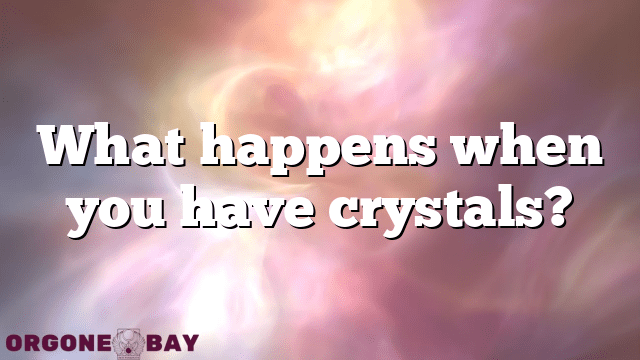Crystal Healing & Well-being
What happens when you have crystals?
As a crystal spirituality expert, I believe that while the physical presence of crystals in your body can potentially cause health issues, the energetic benefits of having crystals in your life are countless. Here are some ways that the presence of crystals can enhance your spiritual and emotional wellbeing:
• Crystals can help clear negative energy from your aura and align your chakras, promoting emotional balance and harmony.
• Different crystals have different healing properties – for example, amethyst can help relieve stress and anxiety, while rose quartz can enhance feelings of love and compassion.
• Many people find that keeping crystals in their home or wearing them as jewelry can act as a comforting reminder of the natural beauty and power of the world around us.
• The practice of working with crystals can also be a meditative and centering experience, helping to ground you and reconnect you with the present moment.
Ultimately, while it’s important to be aware of the potential physical health risks associated with the presence of crystals in your body, I believe that the spiritual and emotional benefits of incorporating crystals into your life outweigh the potential drawbacks. By exploring the energetic properties of different crystals and working with them in your spiritual practice, you can tap into a powerful source of healing energy that can enhance your life in countless ways.
Table Of Contents
Understanding Crystalluria in the Urine
Crystals are naturally occurring in the urine and can develop when the concentration of certain chemicals in the urine is high; the process is called crystalluria. Mostly, crystalluria doesn’t cause any health problems, but when crystals become too large, they can lead to serious medical conditions like urinary tract obstructions and acute kidney damage.
Some factors that can increase the risk of developing crystal formations in the kidneys and urine include dehydration, diet, and certain medications. As such, those who experience recurring crystals in their urine should see a doctor for proper diagnosis and treatment.
Harmless Crystals vs. Potentially Dangerous Crystals
Not all crystals cause problems. Some crystals such as calcium oxalate, uric acid, and cystine are common and harmless. However, some crystals like struvite and some drug metabolites can cause obstructions and develop into large crystals or kidney stones that can block the urinary tract.
In most cases, small crystals get expelled naturally out of the body in urine. However, if the crystals develop into stones, it can be extremely painful and eventually lead to further complications. Therefore, recognizing the signs of crystal formation and seeking medical treatment when necessary can help prevent more severe medical problems.
The Growth of Crystals and Formation of Stones
Over time, crystals can combine with themselves to form larger structures known as stones. The bigger the stone becomes, the higher the risk of it causing urinary tract obstructions. At times, it can develop into a larger stone that can be naturally removed.
Several factors affect stone formation, including the type of crystals present, the concentration of urine, and other physiological factors. High concentrations of minerals and crystals in the urine increase the chances of crystals clumping together and forming stones.
Obstructions in the Urinary Tract
Urinary tract obstructions occur when urine struggles to leave the body due to a blockage in the urinary system. Stones formed by crystals are the most common causes of urinary tract obstruction. Some of the symptoms of urinary tract obstruction can include;
• Pain on urination
• Fever and chills
• Intense abdominal or back pain
• Decreased or bloody urine
• Fatigue and nausea
It’s essential to get medical attention right away if these symptoms persist. In some cases, emergency treatment may be required to restore normal urine flow.
Acute Kidney Damage: Causes and Consequences
Acute kidney damage (AKI), also known as acute renal failure (ARF), is a sudden loss of kidney function that can happen within hours to days. Urinary tract obstructions can cause acute kidney damage. When urine is unable to flow freely due to a blockage in the urinary tract, the kidneys may stop working correctly, leading to the build-up of waste products and fluids in the body.
If left untreated, AKI can lead to severe complications such as permanent loss of kidney function or even death. It’s important to see a doctor as soon as possible if experiencing symptoms related to AKI.
Acute Renal Failure: Symptoms and Treatment Options
Symptoms of acute kidney damage can vary depending on the underlying cause, but some signs that may indicate AKI include;
• Fatigue or weakness
• Swelling of the legs or feet
• Changes in urination patterns
• Loss of appetite
• Nausea or vomiting
Treatment options for AKI depend on the cause and severity of the condition. In mild cases, conservative measures such as adequate hydration, rest, and medications may be enough to resolve the issue. If the condition is severe, however, hospitalization and more invasive medical interventions may be necessary.
In conclusion, the presence of crystals in urine is usually harmless; however, it can lead to urinary tract obstructions, acute kidney damage, and even acute renal failure if left untreated. Recognizing the symptoms and seeking medical attention may help prevent more severe complications.

